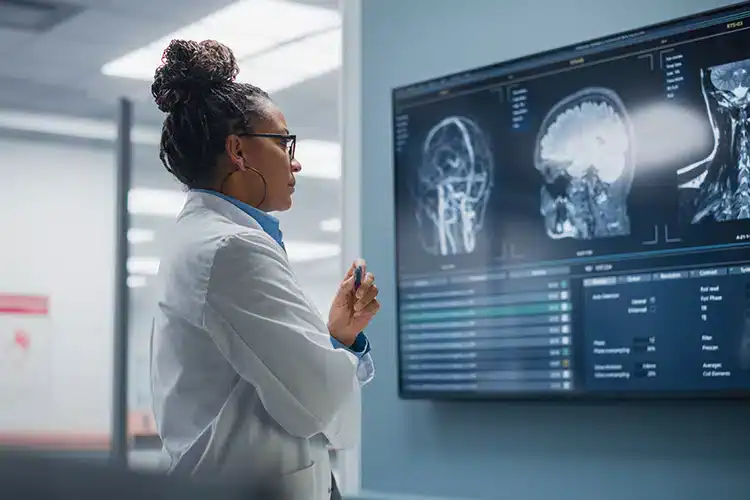What is Healthcare Technology? How is it Changing the Future of Healthcare?
Updated: October 25, 2024
Published: June 26, 2024

Healthcare technology is revolutionizing the way we understand, diagnose, and treat illnesses. From advanced diagnostic tools to AI-driven patient care, the integration of technology in healthcare promises a future where medical services are more efficient, accessible, and effective.
If you have an interest in healthcare or technology, now is an excellent time to enter the field. Emerging healthcare technologies are creating many new career opportunities for professionals. Whether your passion lies in patient care, health informatics, or biomedical engineering, there is a job for you in the healthcare technology sector.

What are the Most Used Technologies in Healthcare?
The healthcare sector is increasingly leveraging advanced technologies to enhance patient care and streamline operations. Here are some of the most utilized technologies:
Electronic Health Records (EHRs)
The most widely used technology in healthcare today is electronic health records (EHRs). EHRs provide a digital version of patients’ paper charts, enabling real-time, patient-centered records that make information available instantly and securely to authorized users.
Artificial Intelligence (AI)
AI is revolutionizing healthcare by enhancing diagnostic accuracy, personalizing treatment plans, and improving administrative efficiency. It supports digital communications by offering schedule reminders and tailored health tips, and it can also help identify patients at high risk for certain conditions, enabling early intervention.
Other AI innovations include robot-assisted surgery, which enhances precision and allows for data-driven decision-making during operations. Virtual nursing assistants use AI to provide personalized care, help patients manage their health, and reduce the burden on healthcare professionals. Predictive analytics leverages historical data to forecast future health trends and improve patient outcomes by anticipating and preventing medical issues. Additionally, AI applications in diagnostics and treatment recommendations are streamlining clinical workflows and improving the accuracy of diagnoses.
mHealth (Mobile Health)
mHealth is being used to provide patients with convenient access to medical information, reminders for medication adherence, and tools for managing chronic conditions like diabetes. Mobile health apps enhance patient-centered care with features such as appointment scheduling, personalized health tips, and real-time communication with healthcare providers.
Internet of Medical Things (IoMT)
The Internet of Medical Things (IoMT) is connecting medical devices to healthcare information systems. It is primarily used for remote patient monitoring, where devices collect and transmit patient data such as heart rate, blood pressure, and glucose levels, allowing for continuous monitoring outside of clinical settings. IoMT also supports telehealth services, enabling virtual consultations and treatment, which enhances patient accessibility and convenience.
Telemedicine
Telemedicine is increasing access to medical services, particularly for patients in remote or underserved areas, and reducing the need for in-person visits. This saves time and costs for both patients and providers. Telemedicine also enhances the quality of emergency services, improves patient outcomes, and allows for better management of chronic conditions through continuous monitoring and follow-up care.
Wearable Devices
Wearable devices are revolutionizing healthcare by enabling real-time monitoring of vital signs, which helps in early disease detection and personalized treatment plans. These devices empower patients to take control of their health by providing continuous data and insights, enhancing patient engagement, and improving overall health outcomes.
3D Printing
3D printing enables the production of customized medical implants, prosthetics, and anatomical models, which improves surgical outcomes and patient-specific treatments. It also facilitates rapid prototyping and manufacturing of medical devices, reducing costs and accelerating the development process.
Virtual Reality (VR)
Virtual reality (VR) is creating immersive training environments for medical professionals, where they can practice their skills without risking patient safety. Additionally, VR is being used for pain management, mental health therapy, and even assisting women in labor, thereby improving patient care and treatment outcomes.
How is Technology Changing the Future of Healthcare?
Advances in healthcare technology are poised to significantly improve patient health outcomes. Technologies like IoMT, AI, and telemedicine are enhancing the accuracy of diagnoses, personalizing treatments, and improving patient monitoring, which collectively leads to better health outcomes and potentially healthier populations. These advancements also contribute to a higher standard of care by enabling more precise, timely, and effective medical interventions.
The cost of healthcare may also be affected by these technological advancements. While initial investments in technology can be high, the long-term savings from reducing errors, preventing hospital readmissions, and improving overall efficiency could lower healthcare costs. Moreover, the integration of technologies such as telemedicine can make healthcare more accessible, reducing the financial burden on patients who might otherwise face high costs for in-person visits and long-term treatments.
Beyond cost and care quality, there are additional gains to be made from healthcare technology. Improved patient safety, enhanced data management, and the potential for remote healthcare services can transform the patient experience. These technologies can help in creating a more equitable healthcare system by reaching underserved populations and providing continuous care regardless of geographical barriers.

Pursuing a Career in Healthcare Technology
If you are interested in contributing to these transformative changes in healthcare, a degree in health science offers an excellent foundation. Health science programs provide comprehensive training in disease prevention, diagnostics, and treatment, equipping students with the skills necessary to improve health. This degree program is perfect for students wishing to deliver patient care.
Meanwhile, if you are interested in creating and maintaining healthcare technology, you might consider a dual degree or double major in computer science and health science. Computer science programs emphasize the development of technological solutions, including software and algorithms, that drive innovations in healthcare.
At UoPeople, our programs are designed to be accessible and affordable, ensuring that a wide range of students can gain the expertise needed to lead in the future of healthcare technology. One benefit UoPeople students enjoy is the ability to complete their degrees quickly thanks to our flexible structure and year-round enrollment options. These programs are designed to allow students to progress at their own pace, potentially completing their degrees faster than traditional timelines.
Additionally, UoPeople is tuition-free. This means we don’t charge students for taking courses, to enroll, or for books or other course materials. This unique online model of higher education allows us to bring the classroom to you, no matter where you are in the world.
As technology continues to advance, the future of healthcare looks promising, with innovations poised to transform patient care, diagnostics, and treatment methods. Emerging technologies are not only enhancing the efficiency and effectiveness of healthcare delivery but also opening up a plethora of career opportunities in the field.
For students aspiring to make a difference in healthcare, now is the perfect time to pursue a degree in health science. The skills and knowledge you’ll gain will prepare you to meet the demands of a rapidly evolving industry and contribute to groundbreaking innovations. By choosing this path, you will join a community of forward-thinkers dedicated to improving health outcomes and making a lasting impact on the well-being of individuals and communities worldwide.
